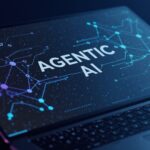Why 2025 is the year AI will revolutionize construction

Generative AI is the tech buzzword of the decade -- and the money has followed obediently. In 2025, American Big Tech firms alone announced an investment of $300bn in AI infrastructure. A year earlier, global venture capital investment into AI startups reached approximately $97 billion.
One sector that runs the risk of falling behind is construction. ONS Business Insights report only 12 percent of UK construction businesses use AI, which likely reflects (and contributes to) a more skeptical view of AI in the industry. Compared with UK employees across other industries, 11 percent fewer construction employees are excited by the prospect of AI in the workplace and 34 percent of construction workers are worried about the technology.
Traditional vulnerability assessment falls short on third-party risks

As organizations increasingly rely on third-party vendors, open-source components, and cloud services to bolster efficiency and scalability, they also open themselves to risks.
Historically they've relied on CVSS scores to measure the severity of risks, but a new report from Black Kite suggests that this method alone is not enough.
IBM brings new AI capabilities to the mainframe
Meta has officially stopped using third-party fact checkers, relying instead on Community Notes

Back at the beginning of the year, Meta announced that third-party fact checking would become a thing of the past on its platforms. The company revealed plans to go down a similar route to X and use Community Notes to allows for crowd-sourced fact-checking instead.
After a short period of testing -- less than a month, in fact -- Community Notes are now starting to appear on Facebook, Instagram and Threads. Meta has also confirmed that, with immediate effect, there will be no new fact check labels on content in many parts of the world.
Microsoft listens to users and revises its WSUS driver synchronization deprecation plans

Microsoft had made much of its plans to deprecate WSUS driver synchronization, announcing the intention in the middle of last year. In January, it issued a reminder that service was being closed down, and then again in February.
But now the company has had a change of heart. WSUS support for driver synchronization was due to come to an end this month, but Microsoft has backtracked saying that -- based on “your valuable feedback” -- it has revised its plans and will keep the service active.
Only a fifth of companies confident their data is AI ready

A new survey, of 1,000 purchasing decision makers across the US, UK, France, and DACH (Germany, Austria and Switzerland) regions, reveals that while AI investment is the top spending priority for nearly half of businesses, only one-fifth of surveyed companies feel confident their data is AI-ready.
The research from Nasuni finds 96 per cent of respondents say they face challenges migrating their file data, creating a major roadblock for AI initiatives. There's also a misalignment in investment priorities, while nearly half of respondents cite AI as their top spending priority over the next 18 months, only a third will invest in the necessary cloud data management.
Trump’s tariffs just broke the US laptop market -- Framework is the first casualty

Framework just pulled a couple laptops from its US store, and sadly, it’s for political reasons. You see, thanks to new tariffs launched by President Donald Trump, shoppers in the United States can no longer buy two base models of the company’s Laptop 13. The two impacted models are powered by Intel’s Ultra 5 125H and AMD’s Ryzen 5 7640U.
No, folks, this is not due to a supply chain issue or a production delay. Make no mistake -- according to a tweet, it’s simply economics fueled by government policy. In other words, Donald Trump’s tariffs are breaking the laptop market.
Google brings powerful visual search to AI Mode for Android and iPhone users

Google may be the current king of search, but thanks to competition from artificial intelligence services like ChatGPT and Grok, its continued dominance is becoming less guaranteed. In other words, Google can no longer rest on its laurels with search -- it must either evolve or dissolve.
In an effort to keep up with the times, Google is delivering its AI Mode feature to more users in the U.S. today. This essentially adds new capabilities that combine visual search with the Gemini AI model. Originally limited to Google One AI Premium subscribers, the feature is now available to millions through the Labs program, accessible in the Google app for both Android and iPhone.
Why companies may be overthinking their cloud transformation

Cloud migration is an essential step for companies looking to scale, optimize, and future-proof their operations, but many organizations find themselves overwhelmed by the complexity of migration, often overthinking the process and getting stuck in a paralysis of what if rather than keeping focused on the more important why.
The problem with this hesitancy is that it is slowing progress for their overall digital transformation. Indeed, cloud migration is a complex journey, especially if the organization in question has multiple sites and decades of sunk costs in legacy technologies. But the cloud migration process can still be simplified and executed successfully, provided organizations focus on the right strategies.
The shift from on-call engineers to agentic incident management

Every engineering team I’ve been a part of has had a 10x engineer. They were active contributors to design reviews -- developing a deep, intuitive understanding of the product and every new feature. Beyond writing code, they reviewed every pull request, tracked every change across the product, and kept a mental map of how all the pieces fit together. They were in the right Slack channels, constantly evaluating process or infrastructure changes to understand how their team might be impacted.
They built operational dashboards, and spent the first 15 minutes of their day scanning key metrics to learn what “normal” looked like so they could spot anomalies instantly. They knew their upstream and downstream dependencies, tracked bugs and releases, and stayed up to date on the tools and platforms their team was built on. All of this context led to one inevitable, risky outcome: whenever something broke, they were the only one who knew where to look and how to fix it.
The impact of AI on professional services [Q&A]

Traditional business models are changing as the adoption of artificial intelligence increases. In the professional services sector there's still heavy reliance on spreadsheets, but a recent survey reveals optimism about AI's impact.
We spoke to Andy Campbell, director of solutions marketing at Certinia, to learn about the impact AI is having on professional services and his outlook for the market.
Microsoft makes a browser-based, AI-generated version of Quake II to promote Copilot -- play it now!

Continually seeking new ways to make Copilot seem appealing, Microsoft has turned to retro gaming as a lure. The company has released a browser-based version of Quake II to serve as a Copilot Gaming Experiences demonstration of AI capabilities.
Microsoft has married its own Research lab’s MuseWorld and Human Action Model (WHAM) to show some of the different powers of generative AI. The company says that “by generating gameplay in real time, the underlying Muse shows how classic games like Quake II can be reimagined through modern AI techniques”. But what will matter to most people is that it is available to try out now, for free.
DaVinci Resolve 20 beta brings over 100 new features and AI tools to Windows, macOS, and Linux -- download it now!

Blackmagic Design has launched the public beta for DaVinci Resolve 20, and folks… it’s a big one. This massive update to the video editing software adds more than 100 new features, and it’s available right now for folks using Windows, macOS, and Linux. And yes, there is even a Windows ARM version too!
This time around, the company is leaning into artificial intelligence pretty hard. After all, AI is all the rage these days -- it must be crammed in. All joking aside, the AI functionality actually seems useful. In other words, it shockingly doesn’t seem to be a gimmick.
Google launches Sec-Gemini v1 AI model to improve cybersecurity defense

Google is once again leaning into its Gemini brand, this time with a focus on cybersecurity. You see, the search giant has announced Sec-Gemini v1, an experimental new AI model. It is designed to help security professionals fight back against cyber threats using real-time data and advanced reasoning. Because AI makes everything better, right?
Look, folks, attackers only need to get lucky once, while defenders have to be right every time. That unfortunate imbalance has made cybersecurity a nightmare for many organizations. Google is hoping AI might change that, giving defenders a slight edge.
The intersection of wellness and technology: How AI is revolutionizing personalized health

Today’s patients expect medical care with a level of efficiency, accuracy, and convenience than ever before. Unfortunately, in a world where medical professionals are overworked and there is a significant shortage in the availability of labor in the healthcare industry, achieving this is easier said than done, which is why many medical professionals have turned to tools like artificial intelligence to boost their efficiency.
In the medical industry, AI has already been used by medical researchers for years, helping them with their experiments and research. However, innovators throughout the health and wellness industry -- including doctors and leaders of supplement companies -- are beginning to find ways to leverage the power of AI to make their operations more efficient and effective.
Most Commented Stories
© 1998-2025 BetaNews, Inc. All Rights Reserved. Privacy Policy - Cookie Policy.





